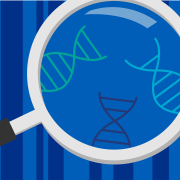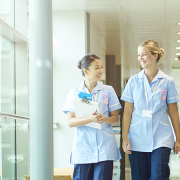Start the conversation: genomics in health visiting
As part of this year’s #GenomicsConversation week, we talk to Sally Shillaker about the vital role genomics plays in health visiting practice
As stated on the NHS Health Careers website, health visitors “work with families to give pre-school-age children the best possible start in life.” But how does genomics help them to help families? Here, we speak to paediatric research nurse and health visitor Sally Shillaker about how genomics can make a real difference.
Hi Sally, could you tell us a bit more about your background in health visiting and your current role with the iHV?
Of course. I became a health visitor after having worked as a paediatric nurse in hospitals and as a school nurse in schools for children with special educational needs and disabilities. I currently work for the Institute of Health Visiting (iHV) one day per week, and also work for a community trust as a paediatric research nurse and health visitor.
At the iHV, we develop resources called ‘good practice points’ or GPPs that are relevant to areas of health visiting practice for our members. Additionally, we also produce resources for parents. We have recently worked with some of the Genomics Education Programme (GEP) team and a genetic counsellor to write a series of five GPPs on genomics.
So, where did your interest in genomics come from?
As a health visitor, I am often copied into results sent from paediatricians to families that explain blood test findings for children where further investigation is required to understand their needs. From about 2016 onwards, I noticed that, for a number of these children, other specialists in genomics were becoming increasingly involved in their care. I realised that this tied in with advances in genomic testing and the NHS’s commitment to improve access to genomic services, and tried to learn more.
One particularly memorable time for me was on my very first day as a research nurse. I had become involved with a project on the impact of the 100,000 Genomes Project for children with rare disease and attended a training session on genomics for non-medical healthcare professionals.
Some of the children who had been part of my health visiting caseload were eligible for the project, which sought to sequence their whole genome to help explain their health needs. Through this, I began to see the great potential for genomics to fill the gaps in our understanding for these children and families.
Looking at current practice, how are health visitors using genomics to support patients? Why are they uniquely placed to do this?
Health visitors care for children and families from the antenatal period to the beginning of primary school, when the child reaches four or five years of age. Ideally, we build trustworthy, honest and professional relationships with families and offer a number of visits throughout this time, many of which are in a family’s home. Families may want to discuss health concerns they have for family members where genomics is relevant, for example, and we do have opportunities – through these relationships with the child and family – to have discussions and offer support around genomics.
Health visitors are also often the first people to notice that a child is not reaching their developmental milestones, often through conversations with concerned parents. As many kinds of developmental delay can have a genomic cause, an understanding of genomics is hugely important so we can support families effectively.
And how do you think genomics fit into the health visitor role more generally?
I feel that genomics is an essential part of care for many children and is therefore an important consideration for us, as health visitors. Just as I work alongside speech and language therapists, for example, I also work alongside genomic specialists to promote early intervention and achieve the best outcomes for the child and family.
In addition to working with families where there are concerns about a child’s development, I think there is a role for us in dispelling myths about genomics that families may have heard. We also offer to journey with families as they wait or receive results, are there to communicate with the genomics team and act as advocates for children and families. In some cases, a child’s condition can change and health visitors may need to liaise with paediatricians and genomics specialists to ensure that they receive appropriate care.
How much and what do health visitors need to know about genomics?
Firstly, I think we all need to know that genomics is a core component of NHS care. It’s not a new trend that might be useful in the future – it’s a vital part of our practice and will only become more important as time goes on.
At a basic level, it is helpful to understand what we mean by our genome and how it differs from our genes, so that we can be clear with families. The GEP have many useful resources to help explain this, including animations and videos. Bitesize courses are also available to help aid understanding.
I also think it’s crucial to be transparent and honest. Being able to speak confidently about the benefits of genomics is important, but health visitors are not experts – and it is not our job to diagnose – so being honest about what we do and do not know is also important.
Do you have any memorable experiences of genomics in your career? Can you recall a time when it made a difference to a patient or colleague?
I remember being the health visitor for one child in particular who had multiple health needs. Health professionals across many different specialisms were involved in order to support the family but it was difficult because there was no explanation for the condition.
After a number of years, advances in genomics meant that whole genome sequencing could occur, and this finally provided some answers. This was enormously helpful, both to the child’s parents and to the healthcare professionals.
Since understanding more about how genomics fits in with mainstream NHS care, I have seen several children who can and do benefit from genomics. This understanding has helped me to discuss further support for the family, and open up a dialogue so that they can ask questions about their journey.
As my knowledge of genomics has grown, I have been able to ask families more informed questions that may mean faster access to specialist help and the avoidance of wasted time being passed from one area to another.
Where would you recommend that health visitors go to learn more about genomics?
I think our GPPs are a great starting point because they are specifically aimed at health visitors. All iHV members can access these. The resources you can read on the GEP website are also fantastic and provide a wide understanding of genomics through a number of different forms, including videos, interviews, podcasts and full courses. There are some amazing charities that also offer great resources for health visitors, such as SWAN UK.
Finally, could you give us any tips for a health visitor who wants to learn more about genomics but isn’t sure where to start?
My recommendation would be to sit down with a piece of paper and do a reflection activity. Ask yourself the following:
- What do I know about genomics? Can I think of any child or family where genomics might be relevant? What happened to the child and family?
- What would I like to know, or think I should know about genomics in order to help this child or family?
Take the list of things you would like to know, or think you should know, and go to the resources mentioned above – the iHV, GEP or charities – to find the answers. I find it helps if you set yourself a deadline to complete this task by.
Lastly, ask yourself:
- So, with what I know now, is there anything I would do differently?
- Is there anything I need to follow up with the child and family?
I would recommend saving your reflection for your yearly appraisal, or take it to your supervisor to discuss if you have any urgent questions.
Sally Shillaker is a paediatric research nurse and health visitor, and professional development officer for the Institute of Health Visiting, where she is responsible for overseeing the development and delivery of publications including the iHV ‘Good Practice Points’ and ‘Parent Tips’.
–
Find out more about health visiting practice, including the latest training and events, and recent publications on the iHV website, or follow them on Twitter: @iHealthVisiting
Interested in training to become a health visitor? The iHV can help you to find out more
–









